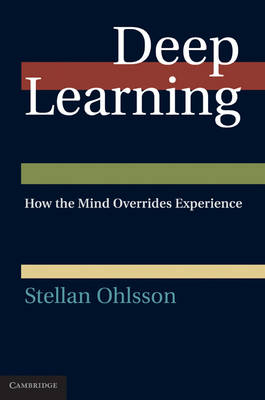
Deep Learning
Cambridge University Press (Verlag)
978-0-521-83568-8 (ISBN)
Although the ability to retain, process, and project prior experience onto future situations is indispensable, the human mind also possesses the ability to override experience and adapt to changing circumstances. Cognitive scientist Stellan Ohlsson analyzes three types of deep, non-monotonic cognitive change: creative insight, adaptation of cognitive skills by learning from errors, and conversion from one belief to another, incompatible belief. For each topic, Ohlsson summarizes past research, re-formulates the relevant research questions, and proposes information-processing mechanisms that answer those questions. The three theories are based on the principles of redistribution of activation, specialization of practical knowledge, and re-subsumption of declarative information. Ohlsson develops the implications of those mechanisms by scaling their effects with respect to time, complexity, and social interaction. The book ends with a unified theory of non-monotonic cognitive change that captures the abstract properties that the three types of change share.
Stellan Ohlsson is Professor of Psychology and Adjunct Professor of Computer Science at the University of Illinois at Chicago (UIC). He received his Ph.D. in psychology from the University of Stockholm in 1980. He has held positions as Research Associate in the Robotics Institute at Carnegie-Mellon University and as Senior Scientist in the Learning Research and Development Center (LRDC) at the University of Pittsburgh, before joining UIC in 1996. His work has been supported by the Office of Naval Research (ONR), the National Science Foundation (NSF), and other organizations. Dr Ohlsson has published extensively on computational models of cognition, creative insight, skill acquisition, and the design of instructional software, as well as other topics in higher cognition.
Part I. Introduction: 1. The need to override experience; 2. The nature of the enterprise; Part II. Creativity: 3. The production of novelty; 4. Creative insight: the redistribution theory; 5. Creative insight writ large; Part III. Adaptation: 6. The growth of competence; 7. Error correction: the specialization theory; 8. Error correction in context; Part IV. Conversion: 9. The formation of belief; 10. Belief revision: the resubsumption theory; Part V. Conclusion: 11. Elements of a unified theory; 12. The recursion curse.
| Erscheint lt. Verlag | 31.1.2011 |
|---|---|
| Zusatzinfo | 15 Tables, unspecified; 44 Line drawings, unspecified |
| Verlagsort | Cambridge |
| Sprache | englisch |
| Maße | 160 x 235 mm |
| Gewicht | 840 g |
| Themenwelt | Geisteswissenschaften ► Psychologie ► Allgemeine Psychologie |
| Geisteswissenschaften ► Psychologie ► Pädagogische Psychologie | |
| Geisteswissenschaften ► Psychologie ► Verhaltenstherapie | |
| ISBN-10 | 0-521-83568-2 / 0521835682 |
| ISBN-13 | 978-0-521-83568-8 / 9780521835688 |
| Zustand | Neuware |
| Informationen gemäß Produktsicherheitsverordnung (GPSR) | |
| Haben Sie eine Frage zum Produkt? |
aus dem Bereich


